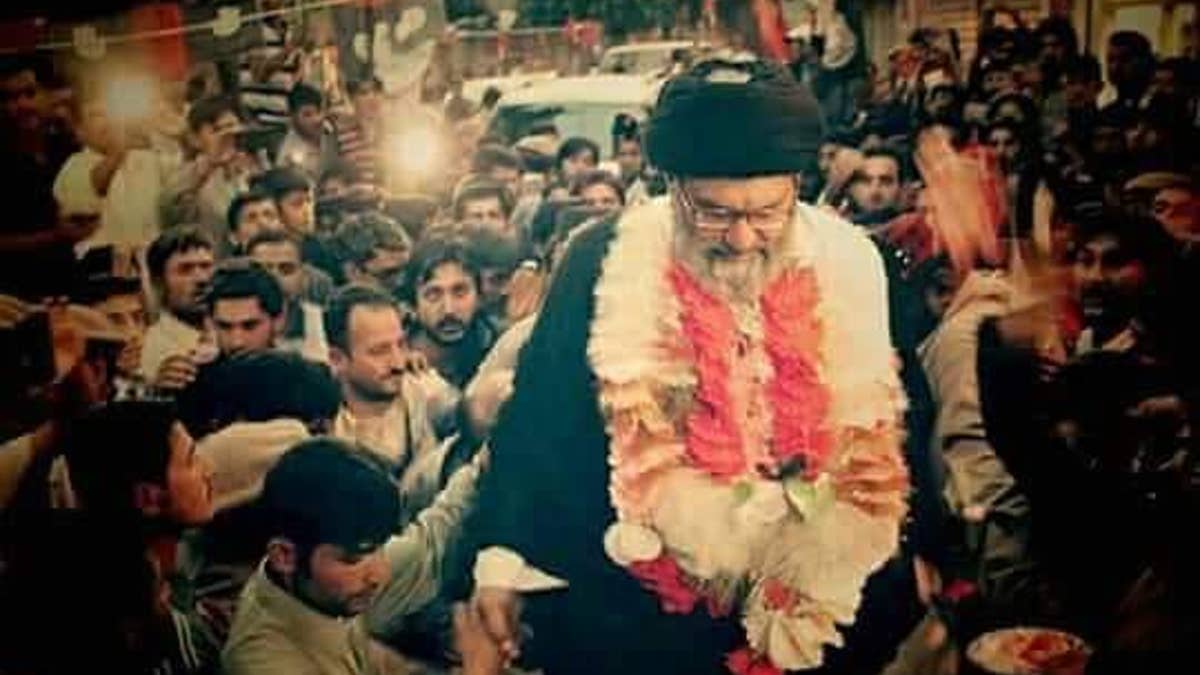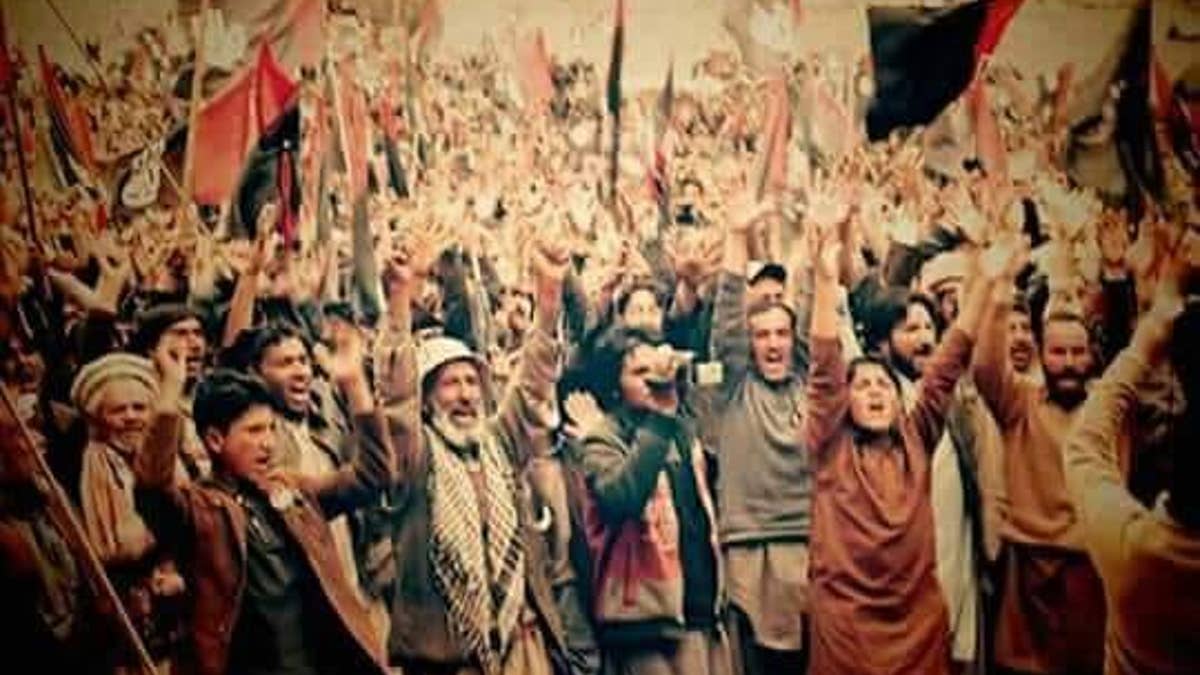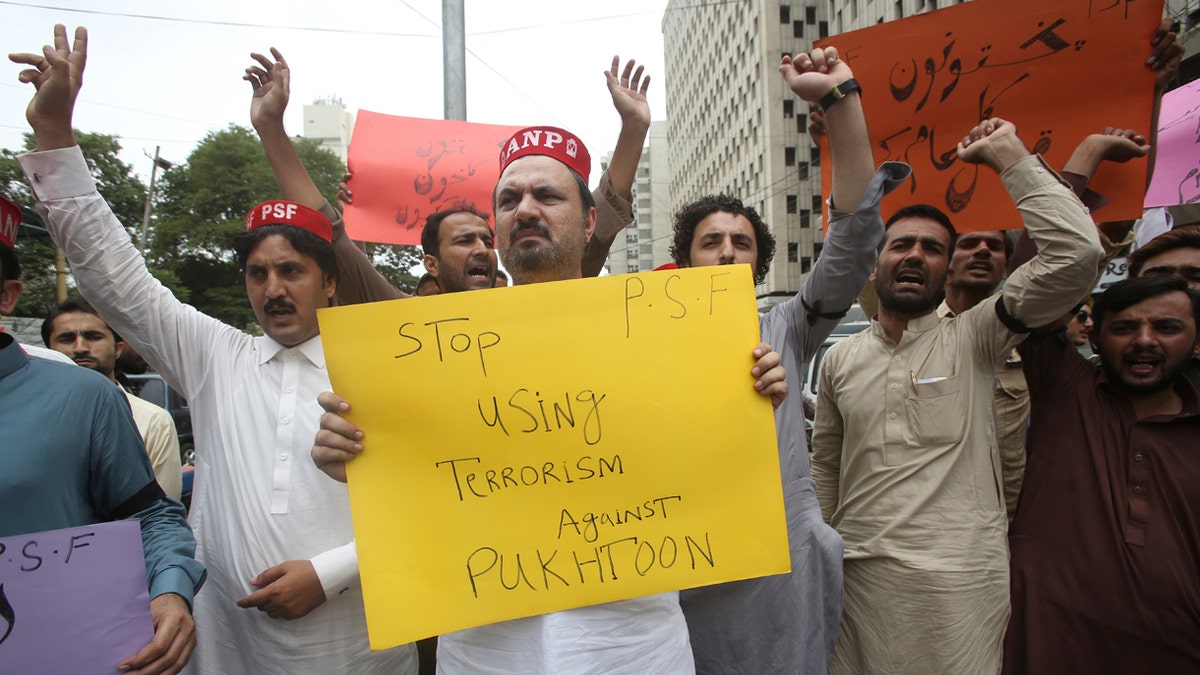
Supreme Leader Ali Khamenei of Iran, alongside members of Pakistan's Shiite political party, Tahrik-e-Jafaria Pakistan (TJP).
Iran is stepping up its involvement with political and militant Shiite groups in Pakistan, in what foreign affairs experts see as an escalating shadow proxy war with Saudi Arabia in a country with the world's second-largest Muslim population.
“Iran is continuing to work to help rebel groups to form in the minority tribal region. There are Sindhi and Baluch separatist groups that Iran will help fund and support,” said retired Lt. Col Anthony Shaffer, a former intelligence specialist.

Members of the Iran-supported Tahrik-e-Jafaria Pakistan (TJP) in Pakistan
Shaffer and others believe Iranians have long funded an array of insurgent outfits in Pakistan, in part as a means to destabilize U.S. efforts in the region.
One of those groups, the Tahrik-e-Jafaria Pakistan (TJP), freely acknowledges its ties to Iran, but denies accusations it engages in violence.
“We are alleged to be a militant group, but I refute this statement,” Deedar Ali, vice president of the TJP, in the country’s Gilgit Baltistan (GB) region, told Fox News. “We haven’t participated yet in militant activities, though we Shiites have the dominance in GB."
TJP is officially considered a Shiite political party, founded around the same time as the Iranian revolution of 1979. It has twice been banned by the Pakistani government as a terrorist organization.
The U.S.-based Terrorism Research and Analysis Consortium (TRAC) defines the TJP as a group focused on creating a society based on “pure Islam,” and both a protector and a propaganda distributor of Shiite ideas.

Deedar Ali, vice president of the political party Tahrik-e-Jafaria Pakistan (TJP) (Mohsin Saleem Ullah)
So just how devoted to the Iranian brand of Islamism is TJP?
“We have close links to Iran and a mutual aim under a shared ideology to stand united under the current longtime supreme leader of Iran, Ali Khamenei, who is the ultimate power for us,” Ali said. “His words stand no less than a decree for us.”

The Taliban and affiliated militia groups continue to destabilize the region. (Mohsin Saleem Ullah)
TJP leaders also frequently visit Tehran, but claim they receive no direct funds from the Iranians.
“We operate under the direct guidance and control of Iran’s supreme leader, which binds us to travel to Iran," Ali said. "I won’t deny the fact that we receive a state guest honor upon our arrival in Iran because we support their ideology as we work together to formulate new strategies to gather mass support. But the members of this group present a monthly amount to run our campaigns; we don’t get funding from Iran.”
The State Department’s most recent Country Reports on Terrorism, released last July, names Iran the world’s “foremost” state sponsor of terrorism, a distinction it has held for decades.
Most notably, the U.S. accuses Tehran of using the Quds Force, an elite unit of the Iranian Revolutionary Guard Corps (IRGC) as a cover for intelligence operations and destabilization across the region.
According to several U.S. intelligence and diplomatic officials, the Trump administration is more concerned about Iranian influence in war-torn, neighboring Afghanistan than it is about the activities of other insurgent groups in Pakistan.
The extremist Sunni creed adopted by the likes of the Taliban in Afghanistan against Iran and the Shiites is one part of the burgeoning proxy conflict. But while Shiites are vastly outnumbered in Pakistan, making up an estimated 20 percent of a Sunni-majority population of almost 200 million, Iran’s quiet support for Shiites could be significant.
“Iran seeks to exert influence by backing militant Shi’a groups inside Pakistan, but there are obvious limits to how far such an effort can go, as Pakistan’s Shi’a are far outnumbered,” explained Jonah Blank, a senior political scientist at the RAND Corporation.
Gilgit-Baltistan (GB), situated in the northernmost part of Pakistan, shares its borders with China to the north, India to the east and Afghanistan and Central Asian states to the west. Previously called the “Northern Areas,” it has exercised semi-autonomy from Islamabad – but has for years chugged on as a precarious, disenfranchised region without the independence of a recognized state.
Iran’s shadowy presence in the area has come under scrutiny in more ways than one,
Thousands of Shiites from Pakistan and Afghanistan have been recruited by Iran – specifically from the Gilgit and Baltistan areas – to fight alongside President Bashar al-Assad’s forces in embattled Syria, offered monthly salaries and postwar employment opportunities in Iran. Recruiters are often Shiite clerics who have studied in or have direct ties to Tehran -- the fighters are to augment its regional clout.

Concerns over sectarian and ethnic violence continue to flare in Pakistan. (Associated Press)
“We want to work closely with Pakistan’s government, but our priority to get a constitutional status for GB in Pakistan can never be stamped down,” Ali asserted. “Why are we yet to get a status? But if this were to happen, I can foresee GB will turn into a battlefield of the Taliban.”
RAPE, MURDER OF KASHMIR GIRL RAISE TENSIONS
PAKISTAN OUT TO CLEAN UP KARACHI, ONCE WORLD'S 'MOST DANGEROUS CITY'
Analysts worry Pakistan will spiral into an even more violent and complicated intermediary war between the region’s archenemies, Saudi Arabia and Iran.
“Iran backs Shi’a groups and Saudi Arabia backs ones that adhere to its own strain of Sunni doctrine,” Blank said. “Iran sees this as a largely defensive operation – protecting co-religionists against a violent onslaught that the Pakistan state is unwilling or unable to stave off.”
Some efforts are being made to quell sectarian unrest. In May, Pakistan’s security forces carried out a raid near Quetta, the capital of Baluchistan Province, killing leaders of the outlawed, Taliban-aligned group known as Lashkar-e-Jhangvi (LeJ), responsible for the deaths of more than 100 minority Shiites.
LeJ started as an anti-Shiite, contrary movement to the Iranian Islamic Revolution almost four decades ago – in which Tehran was quietly exporting its revolution to Shia communities abroad – and later aligned itself with the extremist Taliban and Al Qaeda insurgencies.
Sipah-e-Sahaba Pakistan (SSP) emerged from LeJ in the 1980s, and has been accused by many of ushering in sectarian violence across Pakistan.
Those names were formally prohibited by the Pakistan government in its post 9/11 crackdown. So the group's leading member, Mulana Khalil Saqib, founded a “new” group with the operational name of Muttahida Deeni Mahaz (MDM) in 2013.
“Although it’s illegal to have unlicensed arms in Pakistan, in GB each and every man carries and has a heavy stockpile of illegal arms for a counterfight in the case of any terrorist activity,” he boasted. “As far as financing is concerned, we don’t have backing.”
Saqib later declined to deny he received “hefty funds” from Saudi individuals, stressing that the group has a “firm conviction that Pakistan and Saudi Arabia are brother countries with shared values.”
The group's objective is clear: Push back the Shiites, and the TJP, in GB.
“This Iranian group has been involved in militant activities and innocent killings of Sunni Muslims. We do have demands to wipe off this Iranian group from GB because they have created unrest,” Saqib said. “Their unending sectarian violence has caused us to fight back for our rights. We want the Pakistan government to plan stern action against them.”
Saqib also asserted they have “more than 50 camps operating across Pakistan to train militants” destined for Afghanistan, and he expressed thanks for the “blessing” of the long-running war that opened the door to “opportunity.”
U.S. intelligence and military officials have long accused Pakistan of harboring and aiding such terrorist groups, despite being issued hundreds of millions of dollars in aid as a primary U.S. partner in the post-2001 war on terrorism.
Pakistan consistently and vehemently denies such charges.
In January, President Trump sent a New Years’ Day tweet accusing Pakistan of failing to act against terrorist sanctuaries, which have waged war over the border in Afghanistan, and cut $2 billion in military aid to the country. Last week, the United States suspended a further $300 million.
But several officials in Islamabad vowed to Fox News that they now have full control of a country once teeming with terror, and that all such safe havens have been mopped up and eliminated.
And while Pakistan’s new prime minister, Imran Khan, has vowed to be something of a middleman to help improve the increasingly hostile relationship between Saudi Arabia and Iran, playing two sides inserts Islamabad into something of a quagmire.
Pakistan and Iran are thought to be getting closer, with the two countries having recently resumed discussions over continuing a $7.5 billion Iran-Pakistan pipeline project that started five years ago but has largely remained stalled. Yet government officials are said to assessing how Trump’s pullout of the JCPOA, better known as the Iran nuclear deal, and the subsequent reimposition of economic sanctions may hinder the project.
On the flipside, Islamabad and Riyadh have long been potent allies with a history of close military cooperation. However, Pakistan refused to contribute troops to the Saudi-led war against the Shia-minority Houthi rebels in Yemen, souring bilateral relations.
Pakistan’s Ministry of Foreign Affairs in Islamabad and the Washington Embassy did not respond to requests for comment.
The Foreign Ministry in Tehran refused to comment and the Iranian Interests Section of the Islamic Republic of Iran in the U.S. – which is within the Pakistan Embassy, given that the U.S. has no direct diplomatic relations – did not respond.
The Saudi Foreign Ministry did not respond to requests for further comment.



















